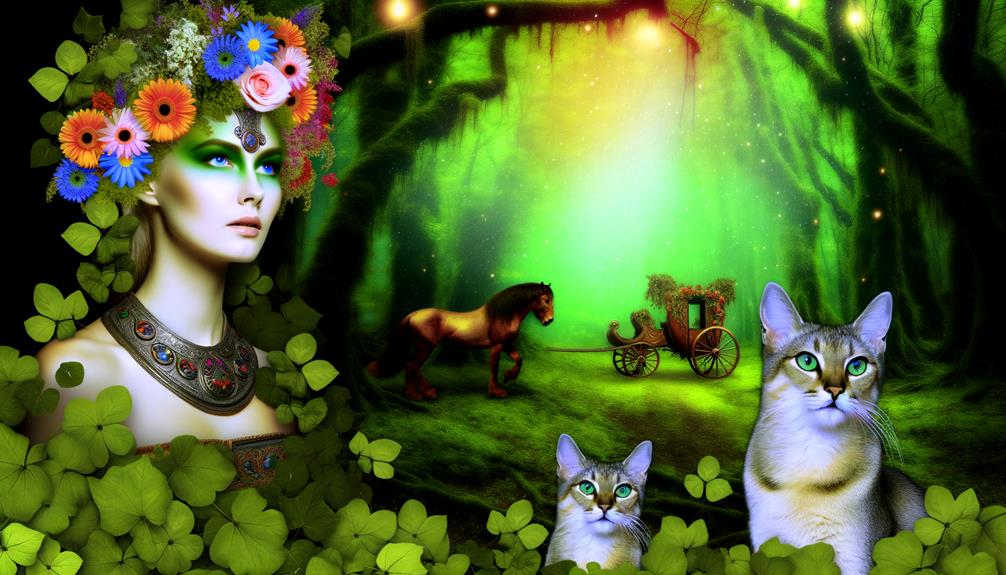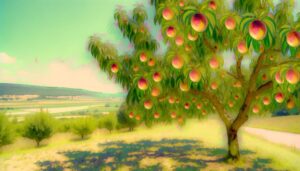Meaning of the Name Freyja
The name Freyja originates from the Proto-Germanic word *frawjô*, meaning 'lady' or 'mistress'. Freyja is a central figure in Norse mythology, embodying love, fertility, beauty, war, and death.
She is revered not only for her nurturing aspects but also for her warrior attributes, receiving slain warriors in battle. Symbols such as her falcon cloak, necklace Brísingamen, and cats reveal her multifaceted nature.
Linguistically, her name's evolution from Proto-Germanic to Old Norse underscores her significant stature. Modern adaptations reflect her continued influence in various cultural contexts.
To uncover her intricate narrative and enduring impact, explore further.

Key Takeaways
- The name Freyja originates from the Proto-Germanic word *frawjō*, meaning 'lady' or 'mistress'.
- Freyja is a Norse goddess associated with love, fertility, beauty, war, and death.
- Her name symbolizes a powerful, multifaceted divine figure in Norse mythology.
- Freyja is associated with symbols like the amber necklace Brísingamen, cats, and a falcon cloak.
- The name Freyja reflects themes of strength, independence, and beauty in modern contexts.
Origins in Old Norse
The name Freyja, deeply rooted in Old Norse mythology, originates from the Proto-Germanic word *frawjō*, meaning 'lady' or 'mistress.' This etymological lineage situates Freyja within a broader Indo-European linguistic framework, reflecting the sociocultural significance of her role.
The term *frawjō* underscores a hierarchical societal structure where women of certain stature were venerated. In Old Norse texts, Freyja's name consistently appears in contexts emphasizing nobility and authority. The linguistic shift from Proto-Germanic to Old Norse involved semantic changes that further solidified her exalted status.
Additionally, philological studies reveal that the name Freyja shares roots with various Germanic languages, indicating a widespread reverence for the figure she represents. This etymological analysis provides critical insights into the cultural and historical dimensions of her name.
The Goddess Freyja
Freyja, revered not only for her nobility but also for her manifold roles within Norse mythology, embodies the archetype of the powerful and multifaceted goddess.
As a member of the Vanir, Freyja is intrinsically linked to fertility, love, and beauty. However, her domain extends to encompass war and death; she is known to receive half of the warriors slain in battle, a role highlighting her martial significance.
Freyja's involvement in seiðr, a form of magic associated with prophecy and altering fate, underscores her mystical attributes. Her narratives illustrate a deity who navigates both the domestic and the divine, blending attributes of a nurturing figure with those of a formidable warrior, thereby portraying an intricate and dynamic character within the pantheon.
Symbolism and Attributes
Freyja, revered as the Norse goddess of love, beauty, and fertility, is imbued with rich symbolism and intricate attributes.
Her association with various symbols, such as the falcon, cats, and the amber necklace Brísingamen, underscores her multifaceted nature.
In mythological narratives, Freyja's significance extends beyond romantic love, encompassing aspects of war, wealth, and the afterlife, consequently rendering her an emblem of complex divine influence.
Goddess of Love
As a multifaceted deity, Freyja embodies the essence of love, manifesting through her intricate symbolism and diverse attributes. Revered in Norse mythology, Freyja's domain extends beyond romantic love to encompass fertility, beauty, and the nurturing aspects of affection.
Her association with love is not merely superficial; it explores the deep, transformative power of emotional connections. Freyja's narratives often depict her as a seeker of love, wisdom, and beauty, which she bestows upon humanity.
Additionally, her role as a goddess of fertility links her to the cycles of life and growth, further emphasizing the generative power of love. Therefore, Freyja's embodiment of love is both extensive and profound, reflecting the multifarious nature of this fundamental human experience.
Symbols and Representations
In Norse mythology, the symbols and representations associated with Freyja are diverse and extensive, each contributing to a thorough understanding of her divine attributes and the cultural values she embodies.
Freyja is often depicted with her necklace, Brísingamen, symbolizing beauty and fertility. Cats, her sacred animals, pull her chariot, representing independence and sensuality. Her affiliation with the falcon cloak, which grants the ability to shapeshift, underscores her role as a deity of transformation and magic.
Freyja's connection to gold, often referred to as 'Freya's tears,' highlights themes of love and loss. Additionally, the boar Hildisvíni, frequently associated with her, signifies strength and protection. Collectively, these symbols encapsulate Freyja's multifaceted nature and her profound impact on Norse culture.
Mythological Significance
Frequently revered in ancient texts, the mythological significance of Freyja is deeply intertwined with her numerous symbolic attributes. Each reflects the intricate aspects of her divine persona and the societal values of the Norse people.
As the goddess of love, beauty, fertility, and war, Freyja embodies dualities that reveal the complexities of human existence and natural phenomena. Her association with the feline chariot, driven by two large cats, symbolizes both grace and ferocity.
The Brísingamen necklace, a symbol of unparalleled beauty and craftsmanship, reflects her role as a patroness of allure and prosperity.
Moreover, Freyja's connection to the afterlife, guiding fallen warriors to Fólkvangr, underscores her integral role in the cosmological cycle of life, death, and rebirth.
Linguistic Evolution
The name 'Freyja' has undergone significant linguistic evolution, originating from the Proto-Germanic term *frawjō, meaning 'lady' or 'mistress.'
Its Old Norse variations reflect regional dialects and phonetic shifts, illustrating the dynamic nature of language over time.
In modern interpretations, the name has been preserved and adapted, continuing to evoke its historical and cultural connotations.
Proto-Germanic Origins
Rooted in the linguistic traditions of ancient Germanic tribes, the name Freyja can be traced back to the Proto-Germanic term *frawjō, which signifies a noble lady or mistress. This term evolved through various Germanic languages, signifying both the cultural importance and the linguistic transformations over time. The Proto-Germanic *frawjō highlights the societal structure and the high status accorded to women of noble descent. Below is a table illustrating the evolution of the term across different Germanic languages:
| Language | Term | Meaning |
|---|---|---|
| Proto-Germanic | *frawjō | Noble lady, mistress |
| Old High German | frouwa | Lady, mistress |
| Old English | frēo | Noblewoman, lady |
| Gothic | *fraujō | Lady, mistress |
This linguistic progression underscores the enduring significance of the name Freyja across Germanic cultures.
Old Norse Variations
Building upon its Proto-Germanic origins, the name Freyja underwent further linguistic refinement in Old Norse, embodying a complex tapestry of cultural and mythological significance.
In Old Norse, 'Freyja' translates to 'Lady' or 'Mistress,' denoting her elevated status within Norse mythology. The name evolved through various phonetic and morphological shifts, reflective of the linguistic dynamism of the time.
The root 'frey-' is connected to words implying nobility and leadership, which aligns with Freyja's role as a goddess of love, beauty, and fertility. Additionally, variations in medieval texts, such as 'Freyia' or 'Freja,' indicate the fluidity of spelling conventions and regional dialects.
The name's evolution underscores the synthesis of linguistic development and cultural reverence in Norse societies.
Modern Interpretations
In contemporary linguistic studies, the name Freyja is examined through the lens of its phonological evolution and its enduring cultural resonance across various Germanic languages. Modern interpretations reveal significant shifts in pronunciation and orthography, reflective of broader linguistic trends.
For instance, the Old Norse 'Freyja' has experienced convergence and divergence in descendant languages, manifesting as 'Freja' in Swedish and 'Freyia' in other dialects. This evolution underscores the name's adaptability and persistent cultural significance. Phonetic adaptations often mirror historical migrations and sociolinguistic changes, providing insights into regional identity formation.
Additionally, the name's mythological roots continue to influence contemporary naming practices, symbolizing beauty, fertility, and strength, thereby maintaining its relevance in modern contexts.
Cultural Significance
The name Freyja holds profound cultural significance in Norse mythology, symbolizing not only the goddess of love, beauty, and fertility but also embodying concepts of war and death. Freyja's duality reflects the complex nature of life itself, interweaving creation and destruction.
Her role as a Vanir goddess and her association with the Valkyries—choosers of the slain—illustrate a balance between nurturing and combative elements. Freyja's chariot, drawn by cats, and her falcon-feather cloak further emphasize her connection to both the earthly and the otherworldly domains.
This multifaceted representation highlights the Norse appreciation for the interconnectedness of natural and supernatural forces, making Freyja a pivotal figure in their mythological and cultural landscape.
Modern Use
Today, Freyja's name endures in modern contexts, often evoking her mythological roots while being repurposed in literature, popular culture, and even as a given name.
In contemporary literature, Freyja symbolizes strength, independence, and beauty, often serving as an archetype for female protagonists.
Popular culture embraces Freyja through various media, including films, television series, and video games, where her character is depicted with attributes resonant with her mythological origins.
Additionally, the name Freyja has seen a revival in personal naming practices, particularly in Scandinavian countries, reflecting a cultural reverence for heritage.
This modern utilization underscores the enduring legacy of Freyja, bridging ancient myth with present-day identity and cultural expressions.
Variations and Derivatives
Numerous linguistic variations and derivatives of the name Freyja exist across different cultures, each reflecting unique phonetic adaptations and historical influences.
In Old Norse, Freyja translates to 'lady' or 'mistress,' which has inspired names such as Freya in English and Freja in Danish and Swedish.
In Germanic regions, the name appears as Freia, while in Hungarian, it is rendered as Frigg. These variations often preserve the essence of the original name while adapting to local linguistic norms.
Additionally, derivatives such as Freyde in Yiddish, meaning ‘joy,’ illustrate the cultural assimilation and reinterpretation of the name. Each version encapsulates a blend of etymological roots and cultural significance, thereby enriching the name’s historical tapestry. The variations of the name Lindy highlight the diversity and evolution of language and culture. Understanding the origin and history of the name Lindy reveals the intricate web of influences and meanings that have shaped it over time. From its roots in Old Norse and Germanic languages to its adaptations in different cultures, the name Lindy carries a rich and multifaceted legacy.
Conclusion
In sum, the name Freyja encapsulates a rich tapestry of historical, linguistic, and cultural threads. Tracing back to Old Norse mythology, she epitomized love, beauty, and fertility.
This nomenclature, evolving through time, has retained its symbolic resonance, influencing various cultural narratives and modern usage.
Much like Athena's wisdom in Greek lore, Freyja's enduring legacy underscores the profound impact mythological figures have on language and societal values.
This demonstrates the perpetual relevance of ancient heritage.






